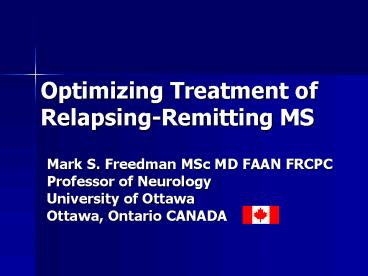Optimizing Treatment of RelapsingRemitting MS - PowerPoint PPT Presentation
1 / 16
Title:
Optimizing Treatment of RelapsingRemitting MS
Description:
What is the long-term value of looking at relapses, early progressions, MRI activity? ... EDSS Progressions Based on T2 activity in years 1-2 ... – PowerPoint PPT presentation
Number of Views:21
Avg rating:3.0/5.0
Title: Optimizing Treatment of RelapsingRemitting MS
1
Optimizing Treatment of Relapsing-Remitting MS
- Mark S. Freedman MSc MD FAAN FRCPC
- Professor of Neurology
- University of Ottawa
- Ottawa, Ontario CANADA
2
General Issues
- Current DMDs are not curative
- Most patients in the trials eventually
experienced outcomes (i.e. relapse, progression
or MRI activity) - With no placebo comparative group, how can you
know if a patient is doing better than expected?
3
Annualized Relapse Rate Regression in Pivotal
Trials
Regression refers to the natural reduction in
relapse-rate that occurs with time alone,
independent of any treatment
4
Expected Annualized Relapse Rate Reduction from
Baseline in Pivotal Trials (With No Placebo)
Expected relapse-rates would be the amount of
reduction that you would perceive if all you did
was compare the time on therapy to the baseline
5
Actual Annualized Relapse Rate Reduction from
Placebo in Pivotal Trials (True Treatment Effect)
Note that the relapse-rate reduction compared to
an on-study placebo group is much lower than
the expected relapse-rate
6
Relapse Rate Reduction with DMT What is the
Real Number?
33
Placebo Effect
Treatment Effect (No Placebo)
True Treatment Effect
Overestimate of Treatment Effect
7
General Issues
- Can we use the same outcome measures as the large
clinical trials to assess therapeutic response in
individuals? - What is the long-term value of looking at
relapses, early progressions, MRI activity?
8
Number of 1-point EDSS Progressions Based on
Number of Relapses PRISMS (n560)
RR 1.25, plt0.001
RR 1.35, plt0.001
No.Relapses
N (y1-2) 139 123 110
68 62 58 N (y1-4) 92
91 97 71 70
139
9
Proportion Progressing Based on Number of
Relapses PRISMS (n560)
Disability correlates with relapse count, such
that each additional relapse increases the odds
of progressing by approximately 40
OR 1.44, plt0.001
OR 1.46, plt0.001
No.Relapses
N (y1-2) 139 123 110
68 62 58 N (y1-4) 92
91 97 71 70
139
10
Optimizing TherapyMRI
- CMSC MRI task force advises not to use routine
MRI to assess response to therapy - Repeat MRI should be performed after diagnosis
if - Patients are unexpectedly worse
- Reassessment for initiation or modification of
treatment (i.e. establishing new baseline) - Another diagnosis is suspected
11
Relapse Count Based on T2 activity during years
1-2 (All Patients with available MRI data)
PRISMS (n515)
r 0.30, p lt 0.0001
r 0.30, plt0.0001
N 210 83 93
91 38
12
EDSS Progressions Based on T2 activity in years
1-2All Patients with available MRI data in
PRISMS (n515)
r 0.17, plt0.001
r 0.14, p 0.002
N 210 83 93
91 38
13
Determining the level of concern to consider
treatment modification based on relapse outcomes
Rate of change is relative to the baseline.
Reference time frame for baseline ? 2 years prior
to treatment initiation.
Ideally, prospective and objective relapse data
should be obtained during the reference period
(minimum 6/12)
Freedman et al, Can J Neurol Sci 31157 (2004)
14
Determining the level of concern to consider
treatment modification based on progression
outcomes
Freedman et al, Can J Neurol Sci 31157 (2004)
15
Determining the level of concern to consider
treatment modification based on MRI outcomes
Freedman et al, Can J Neurol Sci 31157 (2004)
16
The Optimization ModelAssessing the concern
whether to modify a treatment regimen
Each gauge represents a continuum from no concern
(0 on the dial) to a low, moderate or high level
of concern
Relapse
Progression
Hypothesis 3 low, any 2 medium or any 1
high is an indication of sub-optimal treatment
response warranting a treatment change
MRI

